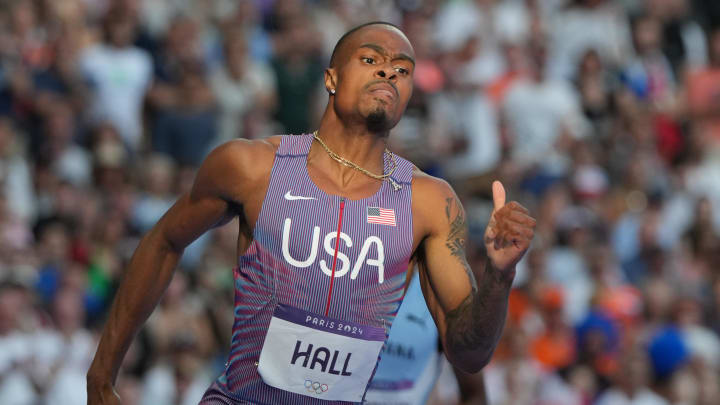Quincy Hall Wins Gold in USA’s Latest Wild Comeback
By Joe Lago

Another day, another insane comeback victory for the United States track and field team.
A day after Cole Hocker's improbable finishing kick to shock the world in the men's 1500 final and three days after Noah Lyles' miraculous comeback in the men's 100 meters, Quincy Hall showed off his home-stretch speed and resiliency to win the gold medal in the men's 400 meters at the Paris Olympics on Wednesday.
In fourth place coming off the final turn, Hall accelerated as if he was shot out of a cannon. He passed Trinidad and Tobago's Jereem Richards and Grenada's Kirani James, the 2012 London Games champion, with about 50 meters remaining. The 26-year-old Missouri native didn't overcome Great Britain's Matthew Hudson-Smith until his final few strides to win in 43.40 seconds, the fourth-fastest time ever.
Hudson took silver in 43.44, the fifth-fastest 400 ever. Zambia's Muzala Samukonga also ran down Richards and James to win bronze in 43.74 seconds.
NEVER doubt Quincy Hall. 😱
— NBC Olympics & Paralympics (@NBCOlympics) August 7, 2024
A EPIC comeback to win 400m GOLD! #ParisOlympics
📺 NBC & Peacock pic.twitter.com/qQJqfxrH9n
Hall, ranked No. 1 in the world in the 400, predicted he would win gold in Paris. However, the 400 meters is not a race that allows for storybook comebacks. It is an all-out sprint around the track that is usually unforgiving for those who fall behind the leaders.
Like Lyles and Hocker, Hall defied logic to become an Olympic champion.
"I don’t give up," Hall told reporters. "I just grit. I grind. I’ve got determination. Anything I think will get me to that line, I think of it. A lot of hurt, a lot of pain."
Team USA's late, inconceivable comebacks at Stade de France are probably not the best strategy to adopt. But, hey, it's been working for the Americans.
Better to be late than never, right?